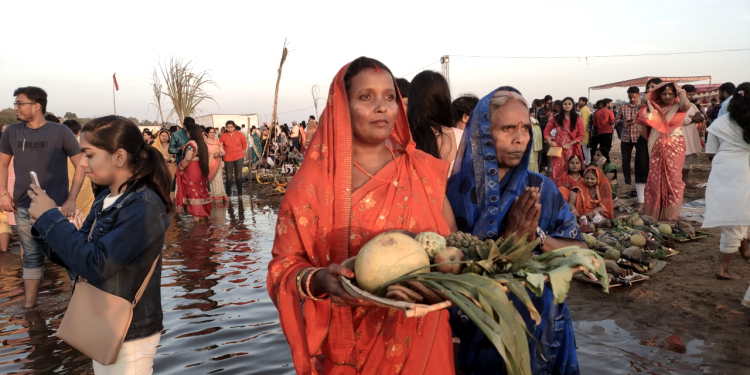Rourkela: With morning prayers Monday, the four-day Chhath celebrations for the more than one lakh Bihari population residing in this town ended. The Rourkela Municipal Corporation had made meticulous arrangements for the smooth conduct of the rituals and celebrations at the water bodies in this city and also on the banks of the river. The president of Bihar Sanskritik Parihad (BSP), Neeraj Chaturvedi informed that the number of devotees had increased manifold this year. “Every year there are 10,000-15,000 devotees who observe penance on the occasion of Chhath. This year the number was well over 30,000,” Chaturvedi said. The BSP which has more than 10,000 members activated volunteers to manage the river banks as well as the ponds. “Water bodies play an important role in Chhath rituals. The city administration had identified 18 ghats where puja rituals were performed.
Volunteers were present to help women who celebrated puja with their families,” Chaturvedi said. He added that the decorations around the ghats had been done by the BSP and post-ritual cleaning of the water bodies will also be carried out by its members. Chhath puja is celebrated over four days. The first day is called either ‘nahai’ or ‘khae’. On this day those who observe penance wash wheat and keep it under the sun for drying, informed Mukesh Sinha, a scribe. The second day is known as ‘Kharna’. “This is the most difficult stage where the ladies who observe penance, cook and eat in the evening.
However, they have to eat in complete silence and bereft of any sound,” Sinha informed. The third day is unique because the ladies pray to the setting sun and early morning the following day they break their fast by offering prayers to the rising sun, Sinha said. He asserted that cleanliness is the most important aspect of the rituals. “In Bihar even the roads are sprinkled with water on which the brati ladies walk to the water body,” informed Sinha.






































